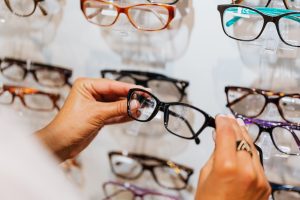
Sustainable Luxury Eyewear: Why Brands Are Transitioning to Eco-Friendly Materials
With climate change becoming an increasingly urgent global issue, the fashion industry has been under increased pressure to make crucial changes to its operations to reduce environmental impact.
Luxury brands like Prada, Hermès, Alexander McQueen, and more have been pivoting towards more sustainable materials and practices to minimise emissions and carbon footprint from production to retail. Other major players like Arc’teryx and H&M Group, as well as H&M Group’s brands, have joined circular fashion initiatives like the Ellen MacArthur Foundation’s Fashion ReModel to foster more sustainable processes in the industry.
Luxury eyewear is no exception to adopting eco-friendly materials, with top brands swapping out plastics and acetate for bio-based versions or recycled items. With eyewear becoming a sought-after accessory due to increased vision issues, growing eye health awareness, and a desire for luxury fashion items, shifting towards sustainability can help reduce the industry’s impact as production demands increase.
Luxury eyewear’s sustainable materials
Luxury eyewear brands have varying approaches to using sustainable materials for their products. Take, for example, eyewear powerhouse Ray-Ban, which hosts an extensive line of eyewear products, including sunglasses, eyeglasses, smart glasses, and much more. The brand offers multiple product lines in bio-based acetate, which is partially made from plant sources. Men’s eyeglasses styles like the Original Wayfarer are available in this material, which is created by mixing cellulose acetate from cotton or wood pulp with a bio plasticiser and contains 67% bio-based carbon content. Stella McCartney has also been committed to using sustainable and recycled materials. The brand is partnering with Mango Materials to help produce eyewear using a biopolymer from bacteria fed with methane as an alternative to plastic. Other eyewear brands, meanwhile, have turned to 3D printing using materials like castor beans to minimise waste and environmental footprint.
Greater consumer demand
Though the luxury eyewear sector’s shift towards sustainable brands is born from a concern for the environment, it’s also a strategic move to retain and attract eco-conscious consumers. In the UK, 25% of consumers strongly agreed that they would like the fashion industry to become more sustainable. Many consider and prioritise products from brands that are firmly committed to environmentally friendly and ethical practices rather than those with few sustainability efforts. By utilising bio-based or recycled materials, luxury eyewear brands can benefit from more interest, higher sales, and a good reputation. Redirecting consumers towards sustainable options can also potentially reduce the impact of traditional materials and production processes. With more people seeking eco-friendly eyewear, the industry’s environmental impact can decrease and prompt other businesses to improve their efforts.

Sustainable Luxury Eyewear: Why Brands Are Transitioning to Eco-Friendly Materials
Reduced footprint and waste
Eyewear manufacturing can be incredibly wasteful, with up to 75% of acetate going unused. Millions of pairs are also thrown away yearly once they break or get replaced. Using sustainable materials ensures that any generated waste won’t have as much impact on the environment as traditional materials. Biodegradable options can break down faster than plastics, and innovative solutions can even accelerate the process. Materials like cellulose diacetate can degrade in natural environments over months to years. On the other hand, the plastic-like polymer derived from wood pulp can lose its mass faster by incorporating microstructural pores called foaming, with low-density cellulose diacetate foam losing 65% of its mass in 36 weeks. If glasses or shades from this material are thrown away, they won’t last very long in landfills or the ocean. Eyewear companies can also reduce the impact of eyewear waste by collecting old frames and integrating them into new frames, creating a circular model that reduces the need for new resources and decreases waste.
Sustainable materials aren’t widely adopted in the luxury eyewear industry just yet, but their potential is acknowledged as more brands transition. Creating eco-friendly eyewear positively affects the environment and provides a unique business edge for companies. As climate change becomes a significant concern, more brands may pivot towards sustainability to reduce waste and pursue ethical practices.
Eleanor Lord is a freelance writer with almost a decade of experience in fashion writing. She focuses on new trends in sustainability and marketing. When not writing, she can be found practicing yoga and hiking.










